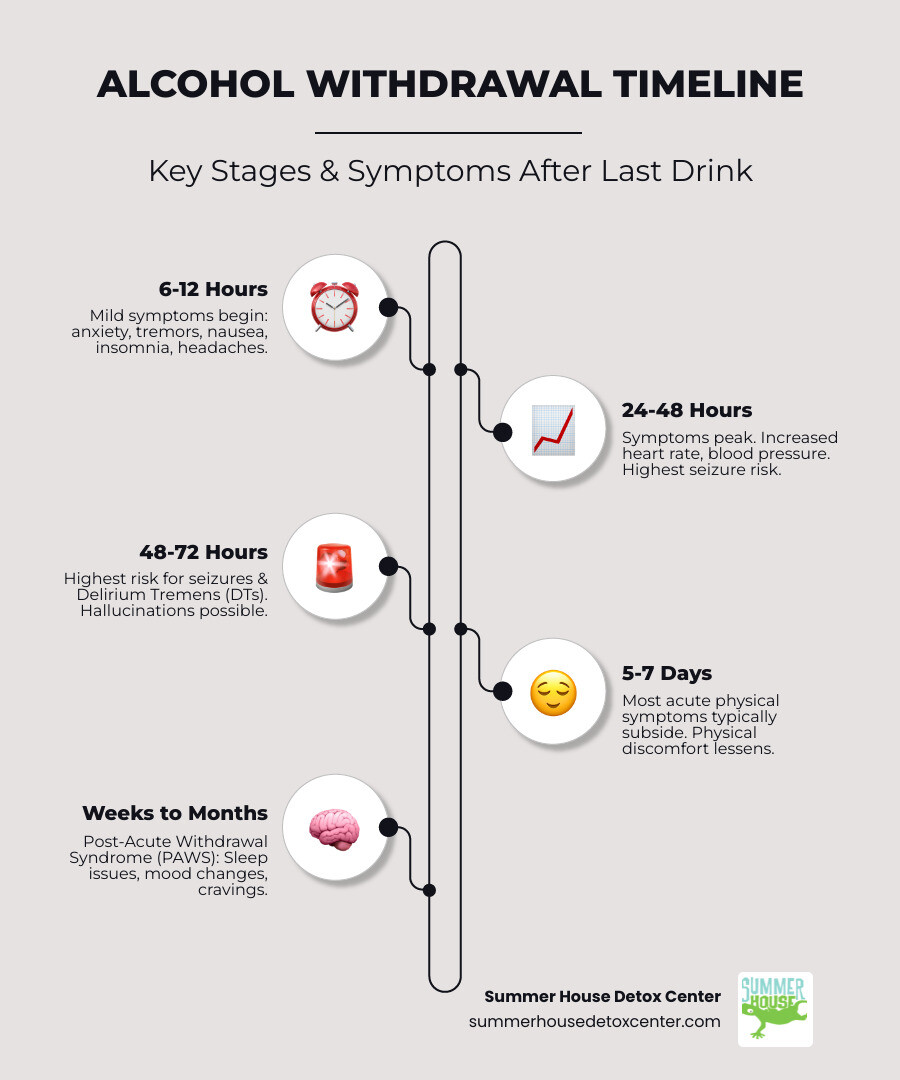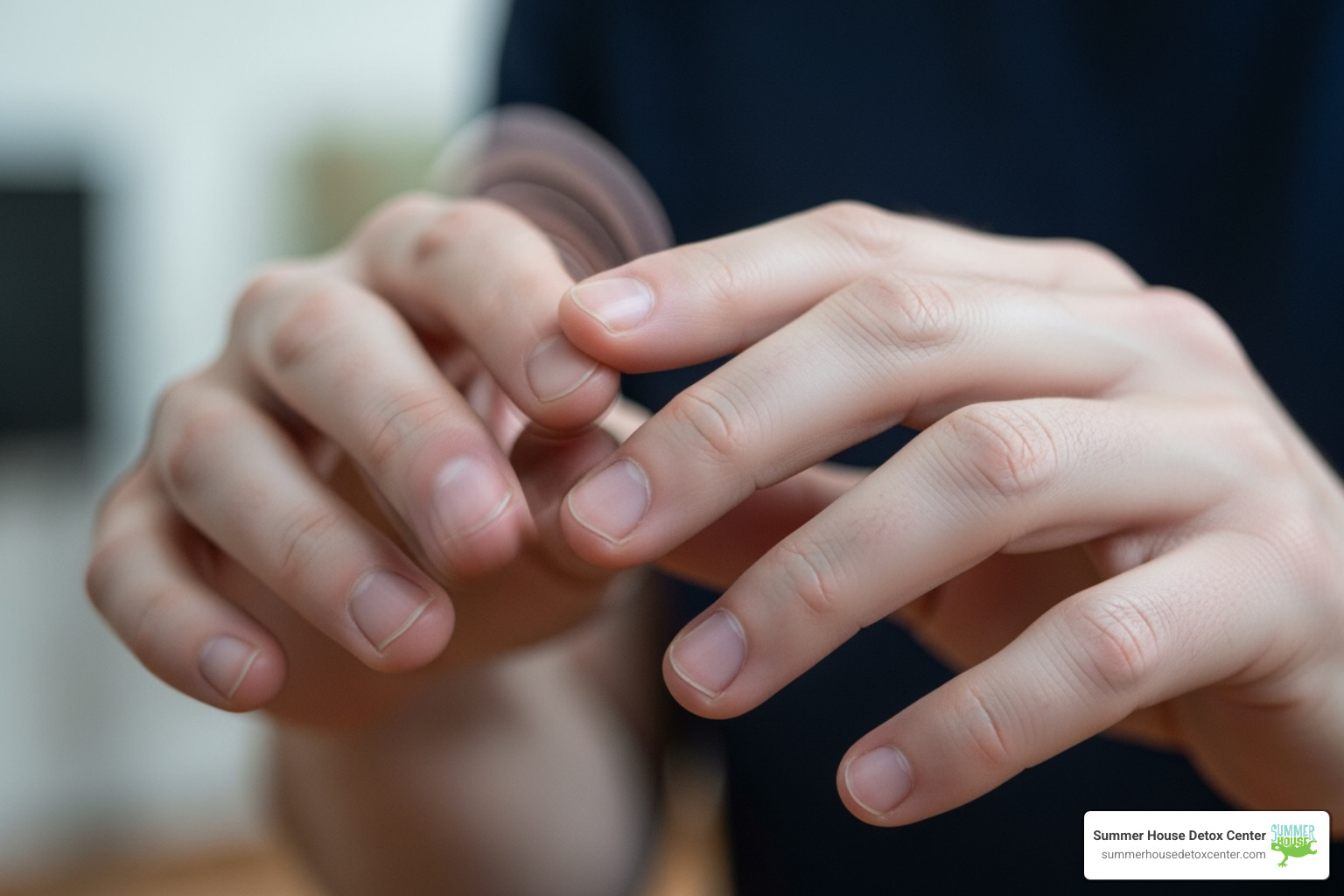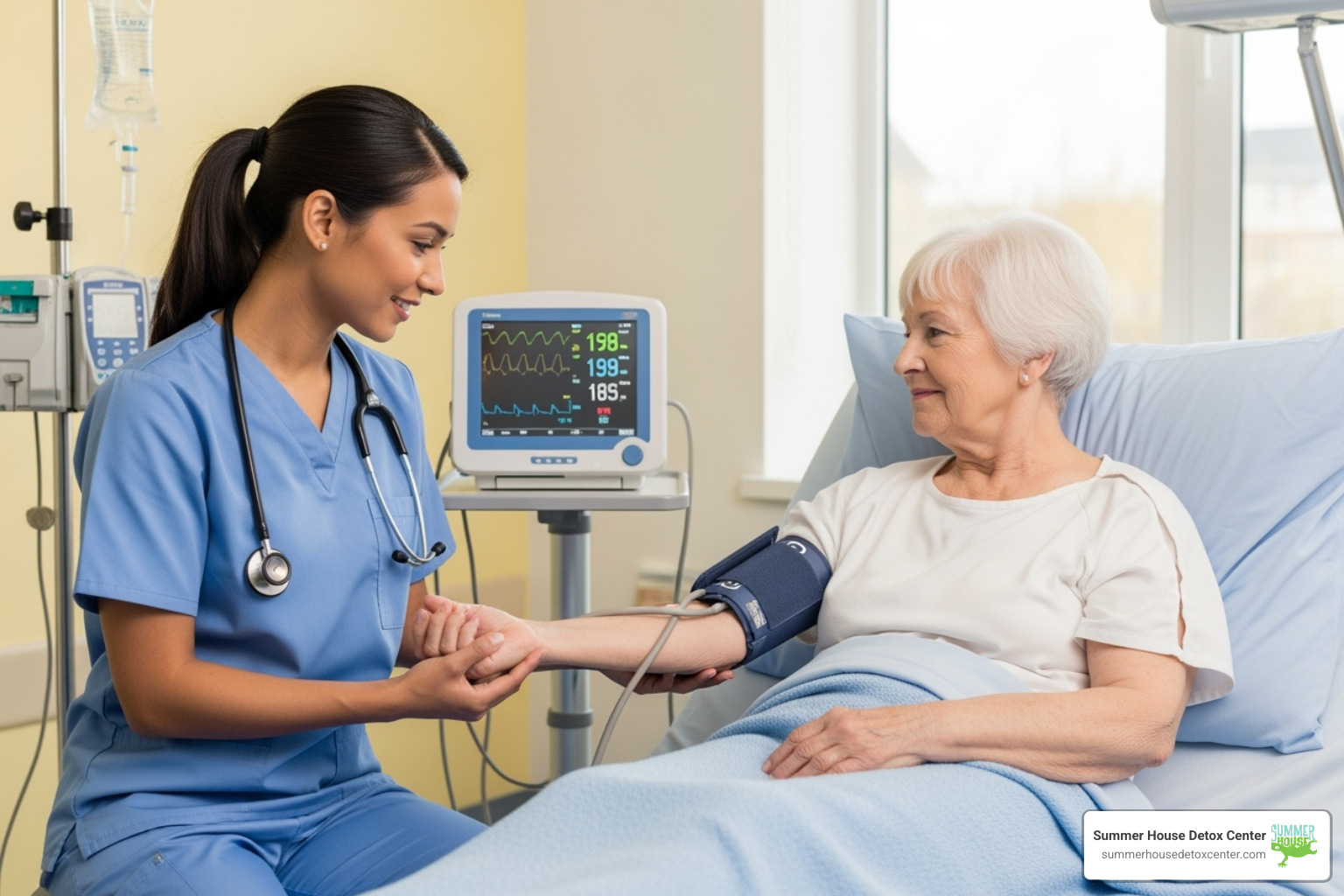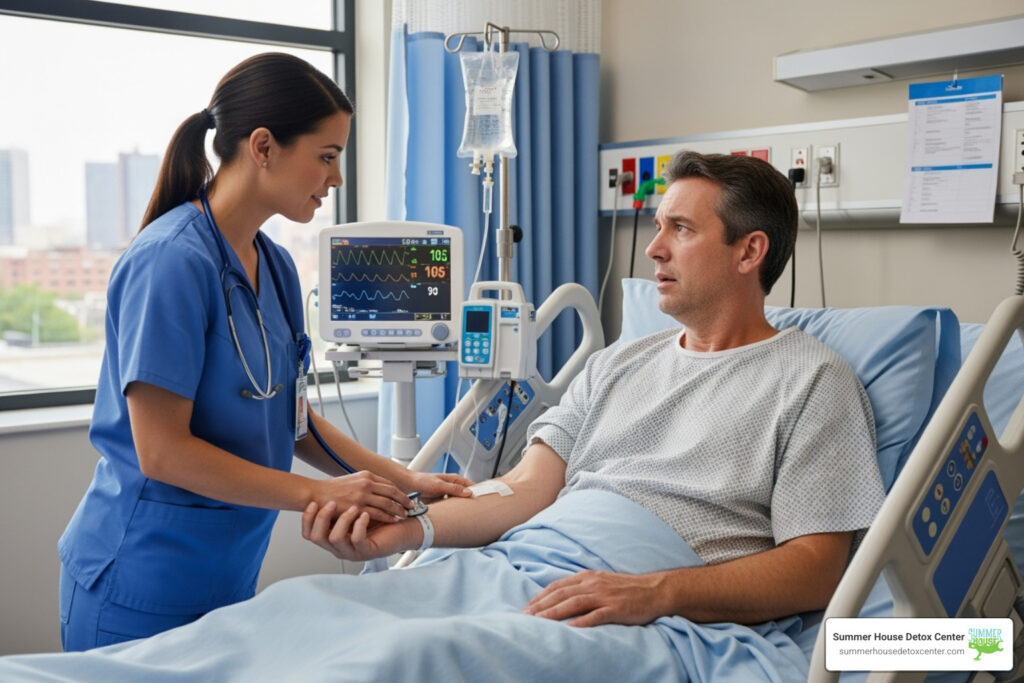Understanding the Critical Need for Safe Alcohol Detoxification
How to manage withdrawal from alcohol safely requires medical supervision, proper medication, and a supportive environment. The safest path is a medically-supervised detox with 24/7 monitoring to prevent life-threatening complications like seizures and delirium tremens.
Quick Guide: Essential Steps to Manage Alcohol Withdrawal Safely
- Seek medical evaluation – Never attempt detox alone if you drink heavily.
- Enter a supervised detox program – 24/7 medical monitoring prevents complications.
- Take prescribed medications – Benzodiazepines reduce seizure risk and manage symptoms.
- Stay hydrated and nourished – Fluids and vitamin supplementation support recovery.
- Plan for ongoing treatment – Detox is the first step toward lasting sobriety.
In Florida, understanding the risks of alcohol withdrawal is life-saving. Annually, the U.S. sees about 500,000 episodes of withdrawal severe enough to require pharmacologic treatment. Many don’t realize alcohol withdrawal is more dangerous than withdrawal from most other drugs. When you drink heavily over time, your brain adapts. Suddenly stopping sends your central nervous system into a potentially deadly overdrive.
“The detox day alone simply sobered me up for a day or two: like a mini break from my hell,” shared one person who attempted home detox before seeking professional help. This highlights why medical supervision is critical.
This guide explains how to manage alcohol withdrawal safely, from symptoms and timelines to finding professional detox services in Miami. You’ll learn why medically-supervised detox is the safest path to recovery for yourself or a loved one.

Understanding Alcohol Withdrawal: Symptoms, Timeline, and Causes
To understand how to manage withdrawal from alcohol, you must first know what happens inside your body. Alcohol withdrawal is a serious medical condition that can be life-threatening if you suddenly stop drinking after heavy, prolonged use. The symptoms range from uncomfortable to fatal, making professional guidance essential, especially for residents in Miami and across Florida.
The Science Behind Withdrawal: Your Brain on Alcohol
Alcohol is a central nervous system depressant. It improves GABA, your brain’s “calm down” chemical, and suppresses glutamate, its “energizer.” Over time, your brain adapts to maintain balance (homeostasis) by becoming less sensitive to GABA and increasing its own excitatory signals. This is why tolerance develops.
When you suddenly stop drinking, your brain’s internal “brightness” is still cranked up, but the alcohol “dimmer switch” is gone. This causes your central nervous system to go into overdrive, a state of “rebound hyperactivity” that triggers withdrawal symptoms.
Recognizing the Symptoms: From Mild to Severe
About 50% of people with alcohol use disorder experience withdrawal when they stop drinking. Symptoms exist on a spectrum and can escalate quickly.

- Mild Symptoms (6-12 hours after last drink): Anxiety, insomnia, nausea, headaches, tremors (the “shakes”), and sweating.
- Moderate Symptoms (12-48 hours): Intensified tremors, increased sweating, liftd heart rate and blood pressure, agitation, and hypersensitivity to light and sound.
- Severe Symptoms (can begin within 12 hours):
- Hallucinations: Seeing, hearing, or feeling things that aren’t there.
- Seizures: Generalized tonic-clonic seizures, typically within 24-48 hours.
- Delirium Tremens (DTs): The most severe complication, appearing 48-72 hours after stopping. It involves severe confusion, agitation, high fever, dangerous cardiovascular changes, and intense hallucinations. DTs are a life-threatening emergency.
For more clinical details, see the Alcohol Withdrawal Syndrome – StatPearls – NCBI Bookshelf.
The Typical Withdrawal Timeline
While everyone’s experience is unique, the timeline generally follows this pattern:
- 6-12 hours: Mild symptoms like anxiety and tremors begin.
- 24-48 hours: Symptoms peak. The risk of seizures is highest. Medical supervision is critical.
- 48-72 hours: The risk of Delirium Tremens is most significant.
- 5-7 days: Acute physical symptoms usually start to subside.
- Weeks to Months: Post-Acute Withdrawal Syndrome (PAWS) may persist, causing lingering anxiety, insomnia, mood swings, and difficulty concentrating as your brain continues to heal.
The unpredictability of this timeline is why facilities like Summer House Detox Center in Miami provide 24/7 monitoring. Safely managing alcohol withdrawal means respecting the risks and seeking professional medical support from the start.
The Dangers of Detoxing Alone: Risks and When to Seek Help in Florida
Attempting to detox from alcohol at home after heavy, long-term use can be deadly. It is not safe to suddenly stop drinking without medical supervision. Your central nervous system, adapted to alcohol’s presence, can go into a dangerous overdrive, leading to life-threatening complications.
Why At-Home Detox Can Be Fatal
Unsupervised withdrawal creates a medical crisis. The risks include:
- Seizures: Full-body convulsions that can cause injury or death, often striking within 24-48 hours.
- Delirium Tremens (DTs): A severe condition with extreme confusion, hallucinations, and dangerous cardiovascular changes. The mortality rate for DTs is estimated between 5% to 10%, even with treatment.
- Cardiac Arrest: Extreme stress on the heart can trigger fatal irregular rhythms.
- Aspiration Pneumonia: Inhaling vomit during a seizure or confusion can cause a dangerous lung infection.
- Wernicke-Korsakoff Syndrome: A brain disorder caused by thiamine (Vitamin B1) deficiency, leading to confusion and potentially permanent memory loss if not treated properly.
In the U.S., approximately 500,000 episodes of withdrawal requiring pharmacologic treatment occur annually. This underscores that professional help is not optional—it’s essential for safety.
Red Flag Symptoms: When to Call 911 Immediately
If you or someone in Florida is experiencing alcohol withdrawal, call 911 immediately for any of these symptoms:
- Severe confusion or disorientation (not knowing where they are or who people are).
- Hallucinations (seeing, hearing, or feeling things that are not there).
- Any seizure activity, including convulsions or loss of consciousness.
- Chest pain, difficulty breathing, or very rapid breathing.
- High fever.
- Severe, persistent vomiting, especially vomiting blood.
- Thoughts of harming yourself or others.
In Miami-Dade County, emergency services like Miami-Dade Fire Rescue are equipped to handle these situations without judgment. Our team at Summer House Detox Center can also provide immediate guidance. Detoxing alone is a risk you don’t need to take; a safer path begins with professional help.
How to Manage Withdrawal from Alcohol: Medical and Supportive Approaches
The only way to safely manage withdrawal from alcohol is through medically-supervised detox. The unpredictable and dangerous nature of withdrawal makes professional care life-saving.
Medically-Supervised Detox: The Gold Standard for Safety
A professional detox center provides a safety net during this vulnerable time. Medical staff monitor you around the clock, ready to intervene if complications arise.

Key components of medical detox include:
- 24/7 Medical Monitoring: Our experienced staff regularly checks vital signs and symptoms, adjusting care as needed. This constant supervision ensures your safety and provides peace of mind.
- Individualized Treatment Plans: We use the CIWA-Ar scale (Clinical Institute Withdrawal Assessment for Alcohol) to measure symptom severity and tailor your treatment. This allows us to create a personalized plan that adjusts as you progress.
- Safety and Comfort: Our primary goal is to keep you safe and comfortable in a calm, supportive environment. Proper medication and compassionate care minimize discomfort and prevent dangerous complications.
While mild withdrawal may sometimes be managed outpatient, moderate to severe cases require inpatient care for safety.
Medications Used to Manage Alcohol Withdrawal
Medications are essential for a safe and manageable detox. They calm the overactive central nervous system as your brain readjusts.
- Benzodiazepines: These are the first-line treatment for preventing seizures, reducing anxiety, and managing agitation. Medications like diazepam (Valium) and lorazepam (Ativan) are used under strict medical supervision, with dosages custom to your specific needs and CIWA-Ar score. Lorazepam is often preferred for older adults or those with liver issues.
- Adjunct Medications: Depending on your symptoms, we may use other medications like anticonvulsants for extra seizure protection, anti-nausea drugs, or sleep aids.
- Vitamin Supplementation: Chronic alcohol use depletes vital nutrients. We provide thiamine (Vitamin B1) to prevent Wernicke’s encephalopathy (a serious brain disorder), along with folic acid and other multivitamins to support your body’s healing.
A balanced diet and proper hydration are also crucial. For more on nutrition’s role, see Substance use recovery and diet.
Why Choose a Professional Detox Center in Miami
For those in South Florida, a professional detox center like Summer House offers significant advantages. We provide a personalized, medically supervised detox focused on comfort, dignity, and support.
As a dedicated inpatient detox facility in South Florida, we offer continuous medical care to ensure your safety. Our serene Miami location provides a supportive, distraction-free environment for healing. We also specialize in treating co-occurring mental health conditions like anxiety or depression alongside addiction, laying a stronger foundation for recovery.
Our compassionate staff, some in recovery themselves, are committed to providing a safe, comfortable, and dignified detox experience. We understand this journey and are here to guide you with respect and expertise. Learn more about our approach at Summer House Detox Center’s alcohol detox services.
Supporting Your Recovery: Self-Care and Building a Support System
Acute withdrawal is just the beginning. Long-term recovery involves self-care and building a strong support system.
Self-Care Tips for Managing Withdrawal (with medical approval)
Warning: Never attempt home detox for heavy, long-term drinking without medical supervision. For those with mild symptoms and a doctor’s approval, these strategies can help:
- Hydrate: Drink plenty of water, electrolyte drinks, and broth. Avoid caffeine, which can worsen anxiety and insomnia.
- Nourish: Eat balanced meals rich in B-vitamins (whole grains, lean protein, leafy greens). If your appetite is low, try small, frequent snacks. See Substance use recovery and diet for more tips.
- Create a Calm Environment: Reduce stress by keeping your space quiet with low lighting.
- Use Relaxation Techniques: Deep breathing and meditation can calm your nervous system. Mindfulness is a proven tool for relapse prevention, as detailed in studies like this one on Mindfulness Meditation for Alcohol Relapse Prevention.
- Try Light Exercise: A short walk can boost your mood and improve sleep, if approved by your doctor.
- Distract Yourself: Engage in hobbies, read, or watch a show to redirect your focus from discomfort.
These tips complement professional care, they do not replace it.
The Role of Support Systems: Family, Friends, and Peer Groups

You should not face recovery alone. A strong support system is crucial.
- Family and Friends: Educate your loved ones about withdrawal so they can respond with patience and compassion. Lean on supportive friends who respect your recovery and distance yourself from relationships centered around drinking.
- Peer Support Groups: Connecting with others who understand is powerful. In Miami-Dade County and South Florida, you have options:
- Alcoholics Anonymous (AA): A well-known 12-step program focused on mutual support. Find local Miami meetings at Find Local AA Meetings.
- SMART Recovery: Uses cognitive-behavioral tools to promote self-empowerment.
- Al-Anon: A support group for family and friends of those with alcohol use disorder.
Practical support is also key. Have someone stay with you, remove all alcohol from your home, and keep emergency numbers visible. Recovery is a community effort, and in Miami, help is available from professionals at Summer House Detox Center and local peer groups.
Frequently Asked Questions about Managing Alcohol Withdrawal
Understanding how to manage withdrawal from alcohol can be overwhelming. Here are concise answers to common questions we hear from people in the Miami area.
How long does alcohol withdrawal last?
The timeline varies, but a general pattern exists:
- Acute Phase: The most intense physical symptoms last about 5 to 7 days. Symptoms typically begin 6-24 hours after the last drink and peak between 24 and 72 hours, which is the period of highest risk for seizures.
- Post-Acute Withdrawal Syndrome (PAWS): Lingering symptoms like anxiety, insomnia, and mood swings can persist for weeks or even months as your brain heals. These symptoms gradually improve with time and support.
What medications are best for alcohol withdrawal?
Benzodiazepines are the gold standard for safely managing alcohol withdrawal. Medications like diazepam (Valium) and lorazepam (Ativan) are used to calm the nervous system, prevent seizures, and reduce agitation.
The choice of medication and dosage is individualized based on symptom severity (measured by the CIWA-Ar scale), medical history, and other factors. This is why medical supervision is crucial. Other supportive treatments include vitamin supplementation (especially thiamine/B1) to prevent neurological damage and adjunct medications for specific symptoms. For more on nutrition, see Substance use recovery and diet.
Can you die from alcohol withdrawal?
Yes, you can die from alcohol withdrawal. It is one of the most dangerous types of withdrawal. Fatal complications can include:
- Severe seizures
- Delirium Tremens (DTs), which has a 5-10% mortality rate even with treatment
- Cardiac arrest
- Aspiration pneumonia
These deaths are preventable with proper medical care. Attempting to detox alone from heavy alcohol use is incredibly dangerous. At Summer House Detox Center in Miami, our 24/7 medical supervision is designed to prevent these complications and keep you safe.
Conclusion: Your First Step Towards a Sober Future
The most important takeaway is that how to manage withdrawal from alcohol safely requires professional medical support. While withdrawal can be life-threatening, the good news is that with the right help, you can steer it safely and begin building a sober life.
You’ve learned why withdrawal happens, how to recognize the symptoms, and why detoxing alone is a dangerous risk. Medical detox is the safest path forward, offering 24/7 monitoring, proper medications, and a supportive environment to ensure your comfort and dignity.
Recovery is a journey, and detox is the first step. For those in Miami and South Florida, Summer House Detox Center provides a safe, comfortable, and dignified start. Our compassionate team, some of whom are in recovery themselves, understands what you’re going through and is ready to help.
You don’t have to do this alone. The path to a healthier future starts with reaching out for help. Take that first step today.
For more information about our personalized alcohol detox services in Miami, visit our alcohol detox page. We’re here when you’re ready.
